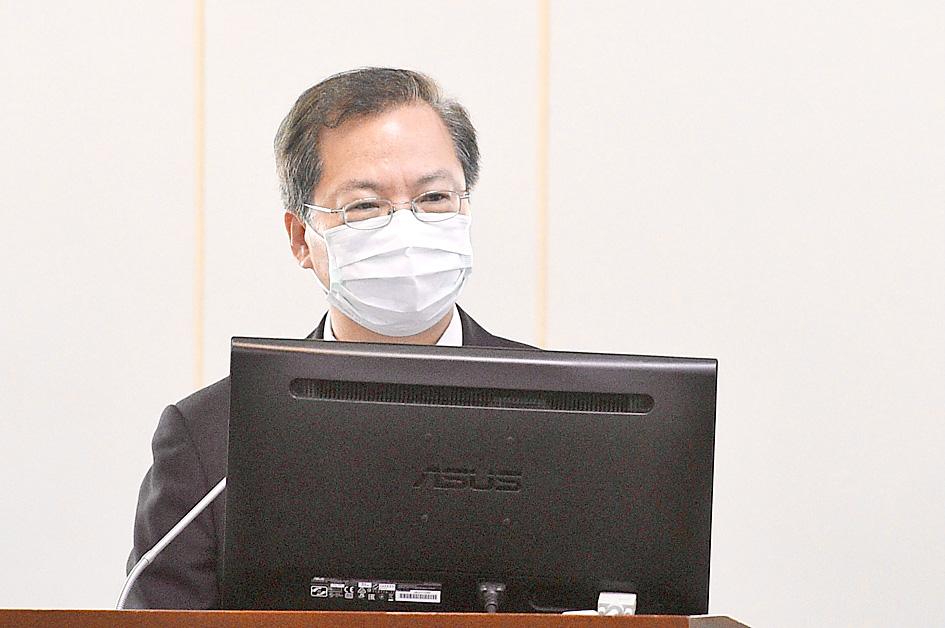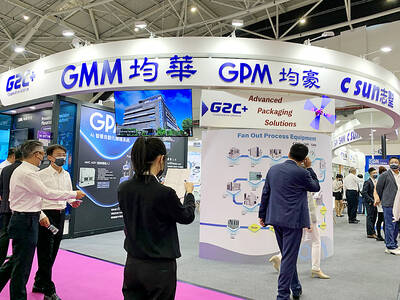Highly skilled blue-collar workers are being excluded from government attempts to attract foreign talent, lawmakers yesterday told a joint meeting of the legislature’s Economics Committee, Social Welfare and Environmental Hygiene Committee, and Education and Culture Committee.
Draft amendments to the Act for the Recruitment and Employment of Foreign Professionals (外國專業人才延攬及雇用法修正草案) seek to ease requirements for foreign white-collar employees who want to work in Taiwan, but in-demand blue-collar workers face much more onerous rules, Taiwan People’s Party Legislator Ann Kao (高虹安) said.
“There are many migrant workers who come to Taiwan to work in our tech factories on the production lines under the Employment Service Act (就業服務法),” Kao said. “They are highly skilled workers, yet they are limited to 12 to 14 years here before they have to leave Taiwan.”

Photo: George Tsorng, Taipei Times
By limiting the employment period of foreign blue-collar workers, Taiwan risks becoming a “training center,” leaving those workers, who could have otherwise made Taiwan their home, with no choice but to move to another country, Kao said.
“With the rising importance of technology in US-Taiwan-China relations, this is a national security issue,” she said.
National Development Council Minister Kung Ming-hsin (龔明鑫) said he agreed that blue-collar talent drain is “of grave concern to Taiwanese industry.”
“It is not an issue that is addressed in the draft amendments,” Kung said. “However, we are in talks with Vice Premier Shen Jong-chin (沈榮津) to deal with the problem separately.”
The talks are still in preliminary stages, he added.
Unlike blue-collar workers, “foreign special professionals” can stay in Taiwan indefinitely and have a pathway to permanent resident status, the council has said.
Foreign special professionals are described as employees who possess special expertise needed by Taiwan in science and technology, economics, education, culture, the arts, sports or other fields as determined by the authorities.
The draft includes extending short-term tax breaks offered to foreign special professionals to attract more talent, Kung said.
“We have a relatively high top marginal income tax of 40 percent versus 22 percent in Singapore and 17 percent in Hong Kong. I hope that by giving highly skilled foreign talent an extra incentive to try living in Taiwan, they will like [Taiwan] so much that they will stay,” he said.
The draft amendments seek to extend the tax break period from three to five years, the council has said.
If a foreign professional’s annual income reaches NT$3 million (US$107,852) during the five-year period, only half of the amount over that threshold would be included in gross income in the assessment of income tax liability, according to the draft amendments.
Simply cutting the tax is not being considered, because that would affect the government’s financial structure, Kung said.
However, he is upbeat that even a short-term benefit could result in foreign professionals choosing to make Taiwan their home, he said.
“People who try living in Taiwan end up loving it here,” Kung said. “We want to encourage more highly skilled professionals around the world to give Taiwan a chance.”

POWERING UP: PSUs for AI servers made up about 50% of Delta’s total server PSU revenue during the first three quarters of last year, the company said Power supply and electronic components maker Delta Electronics Inc (台達電) reported record-high revenue of NT$161.61 billion (US$5.11 billion) for last quarter and said it remains positive about this quarter. Last quarter’s figure was up 7.6 percent from the previous quarter and 41.51 percent higher than a year earlier, and largely in line with Yuanta Securities Investment Consulting Co’s (元大投顧) forecast of NT$160 billion. Delta’s annual revenue last year rose 31.76 percent year-on-year to NT$554.89 billion, also a record high for the company. Its strong performance reflected continued demand for high-performance power solutions and advanced liquid-cooling products used in artificial intelligence (AI) data centers,

SIZE MATTERS: TSMC started phasing out 8-inch wafer production last year, while Samsung is more aggressively retiring 8-inch capacity, TrendForce said Chipmakers are expected to raise prices of 8-inch wafers by up to 20 percent this year on concern over supply constraints as major contract chipmakers Taiwan Semiconductor Manufacturing Co (TSMC, 台積電) and Samsung Electronics Co gradually retire less advanced wafer capacity, TrendForce Corp (集邦科技) said yesterday. It is the first significant across-the-board price hike since a global semiconductor correction in 2023, the Taipei-based market researcher said in a report. Global 8-inch wafer capacity slid 0.3 percent year-on-year last year, although 8-inch wafer prices still hovered at relatively stable levels throughout the year, TrendForce said. The downward trend is expected to continue this year,

‘BASICALLY A BAN’: Sources said the wording governing H200 imports from officials was severe, but added that the regulations might change if the situation evolves Chinese customs authorities told customs agents this week that Nvidia Corp’s H200 artificial intelligence (AI) chips are not permitted to enter China, three people briefed on the matter said. Chinese government officials also summoned domestic technology companies to meetings on Tuesday, at which they were explicitly instructed not to purchase the chips unless necessary, two of the people and a third source said. “The wording from the officials is so severe that it is basically a ban for now, though this might change in the future should things evolve,” one of the people said. The H200, Nvidia’s second-most powerful AI chip, is one

STRONG SALES: The company said that revenue growth momentum would remain strong this year and next year as major customers continue to buy new equipment Semiconductor equipment supplier Gallant Precision Machining Co (均豪) yesterday reported its best annual profit in 19 years last year, as booming artificial intelligence (AI) chip demand boosted sales of its advanced packaging equipment. Net profit surged about 40 percent to NT$415 million (US$13.12 million), compared with NT$297 million in 2024, the company said in a regulatory filing. Earnings per share rose to NT$2.58 from NT$1.82. Revenue grew 5.18 percent annually to NT$4.67 billion from NT$4.44 billion in 2024. Gallant Precision said revenue growth momentum would remain strong this year and next year as major customers continue to spend heavily on new equipment to boost